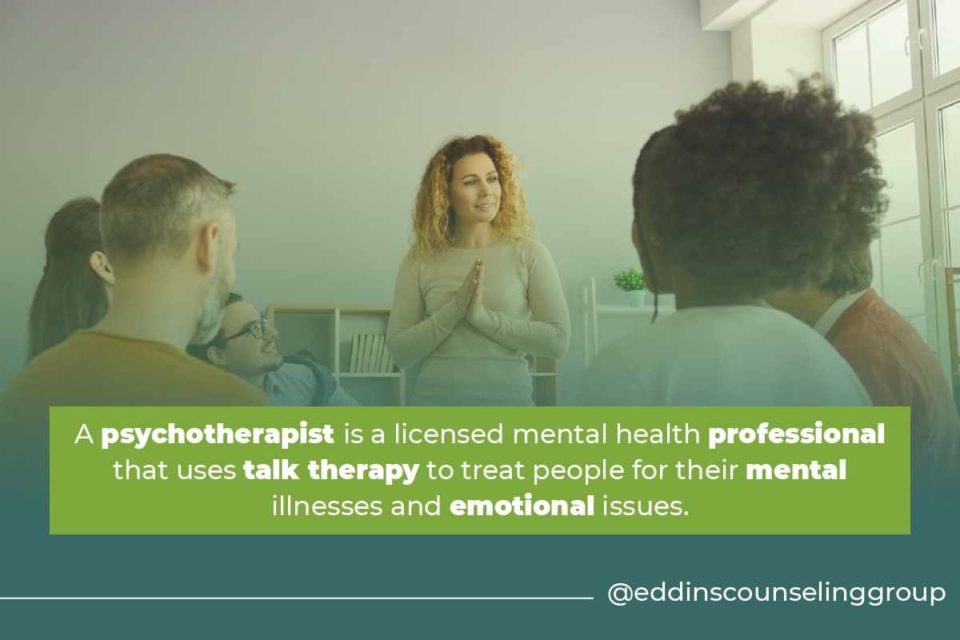May 3, 2021
Psychotherapist vs. Counselor – What is the difference? Who do you need to see?
Written by Sara Lane
Posted in Emotional & Mental Health and with tags: counselor, therapy
Table of Contents
Learn more about what a psychotherapist does.
- What is therapy? What is counseling?
- What is a psychotherapist?
- What does a psychotherapist do?
Learn more about psychotherapy.
- How long does psychotherapy take?
- What services do psychotherapists provide?
- How do therapists define what they do?
Differences between psychotherapists, psychologists, and psychiatrists.
- Counselor vs. Therapist vs. Psychotherapist
- Psychotherapist vs. Psychologist
- Visiting a Counselor vs. Psychotherapist
- Why is there confusion?
- Which do you choose?
Education and training of a psychotherapist.
- What kind of education and licensing does a therapist need?
Learn more about misconceptions about psychotherapy and what to expect.
- What are some misconceptions about therapists?
- What can you expect at psychotherapy?
- Psychotherapy and medication.
Learn more about different types of psychotherapy.
- What are the different types of psychotherapy?
- Cognitive Behavioral Therapy (CBT)
- Dialectical Behavioral Therapy (DBT)
- Interpersonal Therapy (IPT)
- Supportive Therapy
- Other Types of Therapy
- Life Coaching vs. Psychotherapist
Learn more about why you need psychotherapy.
- Does psychotherapy work?
- Do I need psychotherapy?
What is Therapy? What is Counseling?
Psychotherapy is a practice that uses talk therapy to help clients handle challenges and treat symptoms associated with mental and emotional health conditions by helping a person understand their repressed feelings.
Therapy equips its clients to face challenges now and later. There are many different kinds of therapy practiced, and you have probably either used or heard of a lot of them.
For example, there is physical therapy, aromatherapy, water therapy, etc. When you consider the term “therapy,” you probably have some idea of what it looks like.
You may even picture someone lying on a sofa talking about their issues to some professional like in the movies. But therapy, counseling, or its real name, psychotherapy, is much more than that.
In this guide, we will dissect what psychotherapy is, what it can help you with, and why you probably need one.
What is a Psychotherapist (Mental Health Therapist)?
A psychotherapist is a licensed mental health professional that uses talk therapy to treat people for their mental illnesses and emotional issues.
In essence, they are helping clients develop better cognitive and emotional skills. Skills that will, in time, reduce symptoms of mental illness and allow them to cope with life challenges in an effort to improve their lives.
Psychotherapists are nonjudgmental and compassionate.
They are specifically trained to carefully listen and analyze the psychological needs of their patients and help them accordingly.
You may encounter a psychotherapist working as a social worker, counselor, psychologist, and psychiatrist depending on what they went to school for and specialized in.
You can get help with anything from general emotional unrest to extreme trauma or illness. Or, you may just be having a difficult time coping with life, everyday stressors, or your life with a medical condition.
They can help if someone you love has just lost their life and you are having a hard time coming to terms with that loss.
There are so many different kinds of psychotherapy, and different types work better with different types of issues.
Often, psychotherapists use talk therapy with lifestyle or medication changes, but professionals who are state-licensed in psychotherapy are not permitted to prescribe medication.
Read more: How to know if you need counseling.
What Does a Therapist (Psychotherapist) Do?
Specifically, psychotherapists are therapists who are proficient in talking therapy. When you participate in psychotherapy, you have a place to resolve behavioral, relationship, or belief issues actively.
These topics may seem dull, but when any one of these is out of balance, it can throw even the most well-adjusted person off.
Therapists primarily work with clients, whether in-person or via online therapy, to remedy symptoms of stress, depression, anxiety, insomnia, addiction, bipolar disorder, negative behavior patterns, bipolar disorder, schizophrenia, and other debilitating feelings that impact their mental health.
The client and therapist work together through these issues as a team.
Living a healthy, functional life can be difficult, but it’s often the most rewarding.
The goal of therapy is to give their patients the freedom and relief from the stress of life or whatever they need to function normally.
“Functioning Normally”
Usually, “functioning normally” looks like maintaining relationships, performing well at work or in school, and working to improve their overall quality of life.
We often hear people say, “if I can just do this, my life will be better,” or “if I could do that, things would start looking up for me.” All of these goals or aspirations are good to have and important.
But if you are working from a shaky mental foundation riddled with anxiety, depression, grief, eating disorders, etc., these goals will become impossible to reach.
How Long Does Therapy or Psychotherapy Take?
The exact amount of time it takes to reach depends on the client’s primary diagnosis, immediate support system, and the client.
Of course, there are cases where patients feel better after a handful of sessions or even one, but, again, it depends. Some people need years, and others require a therapist present for life to manage their mental health.
If you hope to have any good results in therapy, you will need to understand that you have a problem that evolves into a need for change and the will to work through your treatment plan as advised by your specialist.
Don’t worry, though; the stats are in your favor. Over 75% of people that participate in psychotherapy report benefiting from it.
The practice has proved to improve emotions and behavior and accompany positive changes in the brain and body.
What Services Do Psychotherapists Provide?
Some psychotherapists work in clinical research or a consulting setting, but in an office setting, the psychotherapist’s role in talk therapy is to:
- Develop a productive discussion about your problem or what you are going through, and
- Potentially offer guidance towards a solution
- From an objective perspective, help you better understand what you are going through
- Analyze your conversation in search of harmful patterns or tendencies and help you change your actions to be more in line with your goals
That role can manifest in many different ways and ultimately come across to the client as many additional services.
Here is a list of standard services therapists can offer clients:
- Listening, analyzing present issues, evaluating the influence of the past on the present
- Diagnosing mental health conditions and working to reduce the potency of their client’s symptoms
- Helping clients manage symptoms of mental illness while working to change maladaptive behaviors and thinking patterns and understand themselves and other people to resolve emotional, relational, and professional conflicts effectively.
- Guiding clients through crises such as breakups, abuse, suicidal thoughts, grief, trauma, infidelity, sexual assault, and more
- Teaching clients how to improve current relationships and build new ones
- Teaching clients self-help skills such as deep breathing, meditation, thinking exercises, and more
- Referring clients to psychiatrists, mental health facilities, or medical professionals if necessary
- Helping clients learn to love and accept themselves while reducing the stigma and shame of mental illness and therapy
As you can see, there are many ways therapy can help individuals. You don’t have to be on the verge of a mental breakdown or episode to seek help.
How Do Therapists Define What They Are and What They Do?
Depending on the therapist, their specialty, and how long they have practiced, every answer will differ. All around, therapy is a pretty flexible term.
Psychotherapy is a lot less flexible but still has some wiggle room. At its core, therapy is a guiding hand.
Your therapist will empathize with you and your struggles and be a genuine perspective on what you could do to make your life better. It’s a learning process for both you and your therapist.
They will help you discover your strengths and encourage you to confront difficult emotions, like fear, sadness, or anger, and make sense of them. The most significant selling point of therapy is nonjudgemental guidance, a term that often gets misconstrued as something vague and useless, but they are not there to pave the way for you.
A therapist’s job is to assist their clients in having the confidence to pave the way for themselves.
Counselor vs. Therapist vs. Psychologist
The term ‘therapist” often acts as an umbrella over many different professions like psychotherapists, psychologists, and counselors. When referring to working with clients to improve their mental health and well-being, these words are so similar they are almost interchangeable.
Because of how resemblant they are, using one or the other is left to preference. Meaning if you like saying “counselor” more than you want to say “therapist,” then go for it.
In different areas of the world, one term is usually just more common than the other.
The word “therapist” is often exchanged for the following terms:
- Mental Health Counselor
- Psychologist
- Counselor
- Psychotherapist
“Psychotherapist” may seem like an intense word, but it merely separates their practice from other therapeutic techniques like physical, occupational, massage, etc.
Other differences that separate these terms are involved in their intention.
For example, a therapist (psychotherapist) generally uses talk therapy to treat clients in an office setting for different mental and behavioral issues.
Whereas a psychologist, on average, works in a clinical background studying behaviors and mental illness. Though they, too, can work with clients.
Are you looking for a psychotherapist? Learn about our online therapy services HERE.
A Title and Its Relevance
There is the case where a mental health professional uses the term psychologist out of pure preference even though their work isn’t that much different from a therapist. Another example is a professional that wants to draw attention to their education or background in research.
If we are talking about mental health professionals that can act as therapists, psychiatrists need to be included. While a classic therapist has at least a master’s degree and requires no more, a psychiatrist is a trained physician specializing in mental health medicine, the only kind of therapist certified to prescribe medication.
When seeking care, you won’t find that any of these professionals with any of these titles give less quality care than another. You are likely to encounter professionals with these different titles who have other ideas as to what works for various behavioral and mental health issues.
Visiting a Counselor vs. Psychotherapist
As we discussed, there are a lot of similarities between the two. With that in mind, let’s discuss the differences.
Counseling is used to treat specific mental health circumstances, and issues like disordered eating or grief that the client is battling now and participating in counseling usually occur over weeks or months.
As for psychotherapy, it’s not that it doesn’t cover related subjects or involve multiple sessions; it’s just a little bit to the left of that. The most significant difference is that it mainly focuses on past events that might contribute to present-day problems.
Generally, participation in psychotherapy happens over the years. It involves specific forms of therapy that handle behavioral issues and mental health disorders on top of useless thought patterns that tend to make your life worse.
In contrast, counseling likes to be more specific.
Do those two types seem very relatable to you? Because they are. They overlap a lot, and in a lot of practices, there are counselors who counsel, counselors who practice psychotherapy, and psychotherapists present.
Regardless of how alike they seem, knowing what sets them apart can help choose the right kind of care for you and your needs.
Psychotherapist vs. Psychologist
If you were making a distinction between the two, it wouldn’t be that hard. Generally, a psychotherapist is a more specialized psychologist who has received licensing for talking therapy.
And today, many different psychotherapy schools are highlighting the importance of the relationship with the client only involving conversation, notably without the use of medical therapies or drugs.
At its core, psychotherapy is merely a psychological intervention to address mental health and mental illnesses.
It helps you unravel and demystify emotional issues and, eventually, improve certain aspects of your mental health state that make you more vulnerable.
By communicating with your therapist and attending regular sessions, you are slowly but surely creating a solid foundation from which your mental health can flourish. For example, if you are struggling with anxiety and depression, you will seek a psychotherapist’s support.
They will assist you in establishing a set of coping skills not to be controlled by anxious feelings or seek appropriate outlets during depressive episodes, eventually leading you out of them.
Conversely, a psychologist is involved explicitly in studying the human mind, which is very vague. Because of that vagueness, each professional usually specializes in anything from behavioral, social, educational, and even organizational psychology.
And psychologists do see patients, but it’s usually during an assessment or a study of sorts.
Why is there confusion?
There is so much overlap, and many terms can officially and unofficially cover psychotherapy, psychology, psychiatry, and other things.
A psychiatrist can be a psychotherapist or a psychologist. Or the professional can have a psychology degree, became a psychiatrist, and then got their psychotherapy license.
And though that example isn’t the most often, it is entirely possible.
The most significant difference between a psychiatrist and everything else we have mentioned is understanding pharmacotherapy as they are technically physicians and they can prescribe medication. These include schizophrenia, bipolar disorder, and major depression.
Yet, if psychiatrists are involved with treating mental disorders, are they not involved in clinical psychology? Also, if a psychotherapist technically treats suffering caused by mental disorders, is that not a kind of medicine?
Well, it’s tricky.
Some studies have determined that psychological therapy depends on the quality of the relationship between therapist and client. Using talk therapy is incredibly effective in working on behavioral and emotional issues, which is tricky to pin down and study in a scientific setting.
Because of that, it’s somewhat useless to include psychotherapy as specific to psychiatry as only specific therapies to a particular problem are considered suitable for the studies in labs and research facilities.
Psychiatry is regarded as a form of medicine that will only carry healing solutions with heaps of peer-reviewed studies supporting its claim.
Psychotherapy is not like medication that will solve a chemical issue within a relatively short amount of time. Most of the conditions dealt with in therapy are not resulting from a chemical imbalance but mental and behavioral disorders or, simply, an imbalanced life.
Which do you choose?
No matter who you work with, they will be working with your mind, perspective, and ideas. Whether they be a psychologist, psychiatrist, or a psychotherapist, a licensed mental health professional will be able to help you feel better and give you the tools to create a more enriched, whole life.
They will have the training and knowledge to help you feel better and establish a specific state of mind that will bring you stability and emotional balance. When was the last time you had that?
When searching for the right mental health professional, keep in mind your needs and your needs alone.
If you have a family history of bipolar disorder and spect that you are now suffering from the same thing, a psychiatrist may be the best option for the first consultation.
On the other hand, if you have difficulty dealing with the stressors in your daily life or with anxious thoughts and feelings, you might want to seek a professional psychotherapist.
Of course, by reading this, you are taking a decisive step towards getting care. Choose after you look around and do some research, but remember, it’s not your job to know what care you need before seeing a professional.
In most cases, if medication is required, your psychiatrist will recommend working additionally with a therapist to round out your mental health treatment.
What Kind of Education and Licensing Does a Therapist Need?
The first step toward becoming a psychotherapist is completing an undergraduate degree that they can use to enter a graduate program and complete their master’s degree. Some mental health professionals stop at this point and practice psychotherapy, and they would be considered a counselor.
The difference between being called a counselor, psychologist, or psychiatrist is merely in degrees, licensing, and titles.
Nevertheless, every state has different requirements for what they require to practice psychotherapy, but that process always starts with completing a graduate program. Once your master’s degree is completed, it’s generally all about licensing next.
And there are several types of licenses one can attain, and each specifies a service the professional is allowed to provide. These include:
- Doctor of Psychology [Psy.D.]
- Licensed Clinical Social Worker [LCSW]
- Licensed Marriage and Family Therapist [LMFT]
- Licensed Mental Health Counselor [LMHC]
- Licensed Professional Counselor [LPC]
- Pass the Examination for Professional Practice in Psychology (EPPP) which requires completion of 1500 and 1600 hours of hands-on, supervised experience in the form of practicum hours.
Recently, attention has been brought to the similarity between a therapist and a social worker due to the social work licenses. The way everything is named can get confusing quickly.
Both a social worker and a therapist is in the business of assisting individuals towards what can be boiled down to better living, but they have their differences.
Anyone serving as a therapist has clinical experience and can work as a social worker. Are you confused yet? But it doesn’t work the other way around.
Social workers don’t have clinical experience or a therapist license, meaning they cannot work as therapists.
Every therapist you will ever meet was required to 1. complete a master’s degree and 2. become licensed by their state to practice psychotherapy legally. Also, that license is very limited in terms of working in different states, but therapists are more than welcome to practice in any foreign country via online therapy.
What are some misconceptions about therapists?
Psychotherapy is an incredibly diverse field with a lot of individuals working in opposing directions. Mental health is a complicated thing. Treating mental health issues is no small feat.
More often than not, your friend isn’t going to tell you something you don’t want to hear or take your grief, trauma, or depression into account as they give you ideas on how to move forward.
A therapist has an intense understanding of mental health and behavioral disorders, which gives them an insight into your issues that you may never even knew existed.
Misconception #1 A therapist is like a really smart friend that you just happen to pay to listen to you and help out with stuff.
Ultimately, your therapist is not your friend. The idea that they are makes their advice mean a lot less because it’s no longer considered a professional opinion. You are ignoring the fact that that title took years to achieve and it’s no small feat.
More often than not, your friend isn’t going to tell you something you don’t want to hear or take your grief, trauma, or depression into account as they give you ideas on how to move forward.
A therapist has an intense understanding of mental health and behavioral disorders which gives them an insight into your issues that you may never even knew existed.
Misconception #2 Your therapist is just going to tell you what to do.
Again, no. Not many therapists you find will just hand you a list of instructions and send you on your way. If you just thought, “well, why not?”
Generally speaking, visiting a therapist is not to learn how to build a metaphorical crutch (which is what a list of instructions would ultimately become). Still, instead, they teach you how to walk again.
Your therapist is going to give you the skills to deal with life as it comes. They allow you to live a better, more fulfilled life. A therapist is a guide to help you make better decisions for yourself to prevent a relapse into old, useless thought patterns.
When you work with a therapist as an individual, as a couple, or even in a group setting, you’ll be empowered to handle issues, adjust the parameters of life as you see fit, and grow in ways your mental health would have never let you before.
Misconception #3 Your therapist will be able to know what you are thinking and feeling.
Like everyone else, a therapist is a human, and as good as they may be at understanding you, your tone of voice, and even your body language, they are not mind-readers.
Of course, your psychotherapist will be very interested in what you are thinking, but the therapy process involves a lot of talking. It’s important to communicate details about your life and what you are going through to help you progress and resolve issues. Like any other person, they will only be able to know what you share with them.
And over time, as you share more and develop a bond with your therapist, they will understand you better, and you will make incredible progress.
What to Expect at Psychotherapy
Like your initial appointment with most any practice, you’ll have paperwork to fill out so that they can have a well-rounded understanding of who you are and where you are coming from.
You’ll be asked about medical history, medication you are on, and, depending on the practice, there will probably be a few very general questions about why you have come in today.
As your actual sessions begin, it will be about getting to know each other, ensuring they are a good fit because it is perfectly okay if it is not, and understanding what you are facing.
All of this will help your therapist determine the best form of treatment.
The Details
A psychotherapist can treat both children and adults. If you have ever heard of anyone’s child participating in counseling, they are most likely working with a psychotherapist.
Working with a psychotherapist can consist of either a short-term arrangement to work on immediate issues or long-term, more involved treatment of complex challenges.
How are Psychotherapy Sessions Conducted?
The short answer is any way you need. You could attend therapy
- with your partner as a couple for couples counseling
- alone in an individual setting for personal counseling
- as a family for family counseling
- in a group setting to participate in group counseling
Group therapy is where individuals discuss and go over different issues relating to the same topic.
For example, there are groups for everything from eating disorders and intuitive eating (make peace with food) to adult DBT skills, teen DBT skills, and DBT skills for parents of teens . These sessions are usually held once a week, with anywhere from 5-30 people in attendance, depending on the practice.
The therapeutic process is a very active one, and there is an incredible amount of trust involved. There must be a good deal of certainty in the relationship between client and therapist as clients often deal with very sensitive issues that should be treated as such.
Another element of psychotherapy, besides trust, is confidentiality which supports other vital components like safety, comfort, and honesty.
Psychotherapy and Medication
Some people feel that they should never use medication. Others think that their issue is a specific chemical imbalance that should be assisted with medication specifically while feeling that talking therapy would be useless.
Of course, there are mental health situations where medication is the clear solution; others will be best catered to by psychotherapy.
More often than not, the two are used in combination with one another. For many people, creating a working balance with medication and psychotherapy usually does a better job than just using one method alone.
In either case, healthy lifestyle improvements will provide essential support to a person’s overall well-being, including modifications such as maintaining good nutrition, exercising regularly, and achieving adequate sleep.
What are the Different Types of Psychotherapy?
To be sure, it would be misleading to say that there are only a few types of psychotherapy as there are several. Your therapist would generally be the one to advise the exact type you’d benefit from, but it’s good to know what is out there.
When you meet your therapist within a few sessions, they will probably have a pretty good idea of where they’d like to start and what therapy they would like to use. They may even advise an amalgamation of different therapy treatments based on an individual’s mental health condition.
There are also plenty of psychotherapists that specialize in the forms of therapy we discuss, or their practice has an intense focus on a different type.
Remember, these descriptions are not a substitute for getting care. If anything, this list should encourage you to seek help. The following kinds are easy to list, but there is so much more to these practices.
So, even though it is always good to be more informed, you should still see the professional trained in helping you using these forms.
Cognitive Behavioral Therapy (CBT)
The most common of all the therapy practices, cognitive behavioral therapy or CBT, is a practice that specifies helping you identify and change patterns in your behavior and thinking that hinder you and your life.
This means your focus is on two things.
- First, you distinguish thought and behavioral patterns and give them names. In other words, you have a harsh conversation with a loved one, and you overreact. Once this happens, you can step back and say, “Woah, I overreacted.”
- Your therapist will teach you how to replace the harmful stuff with accurate thoughts and functional behaviors. Especially in heightened situations being able to see your feelings for what they are, separate from them, and see the situation as it is will allow you to handle this example of conflict in a productive way.
All of this may seem simple, but if you think back to moments of stress or anger, did you handle them as well as you could? Were you in control of your feelings or were they in control of you?
In particular, this practice allows people to face current issues as they come and work to solve them.
Think back to your youth, were you taught many ways to handle difficult situations and emotions with ease and clarity? The majority of people were not and that’s okay, but it’s time to take responsibility for how easily you get emotional and let it control you and your actions.
CBT can be effective in working with disorders such as:
- Post-traumatic stress disorder (PTSD)
- Anxiety
- Depression
- Insomnia
- Eating disorders
Another demonstration of CBT in practice could be in helping someone with anxiety. It will help them recognize negative and destructive thought patterns and behaviors and give them the tools to change them.
Dialectical Behavior Therapy (DBT)
If you are someone that traditional psychotherapy has done little for, you may have heard of this. DBT is a type of Cognitive Behavioral Therapy(CBT) that, most notably, helps people regulate their emotions.
DBT is most often used for people struggling with the following:
- Long-term suicidal thoughts
- Borderline personality disorder
- Eating disorders
- PTSD
With this therapy practice, you will be taught coping skills based on responsibility and learn how to change and redirect unhealthy behavioral patterns. When you participate in DBT, it involves group and individual therapy.
Interpersonal therapy (IPT)
Whereas CBT happens over an extended period of time, IPT or interpersonal therapy happens over a short period of time. It is a more intense version of psychodynamic therapy, which is discussed below.
IPT focuses on underlying interpersonal issues and works to train you to express feelings more accurately and enhance your communication skills. It specifically helps people struggling with grief, relationship conflicts, changes at work and within their life.
These sessions are in more frequent intervals than other practices. Usually, they are held more than three times per week and most often used to treat depression.
Interpersonal therapy is based on the idea that mental and behavioral health is heavily influenced by your childhood experiences and repetitious mismatched thoughts and feelings that you may not be aware of.
Supportive Therapy
Have you been in a tough situation, and you go to a good friend or mentor for advice, and they just get it? If you have, you understand a bit about supportive therapy.
This is a specialty that uses gentle guidance and encouragement to allow clients to develop and advance their inner resources. Using this practice can help you build self-esteem, strengthen coping mechanisms, reduce anxious thoughts, and improve social functioning.
Supportive therapy is different from traditional psychotherapy because they offer more input than normal.
Some people find this to be all they need because their ways of going about life are not entirely unhealthy or dysfunctional, rather they just need a bit of a push. A therapist can do that and steer you away from the unhealthy and dysfunctional.
Other Types of Therapy
There are plenty of other therapies that studies have shown to be effective in treating different mental health conditions like anxiety, depression, and grief.
Some of these include:
- Creative arts therapy – use of art, dance, drama, music, and poetry therapies
- Play therapy – to help children identify and talk about their emotions and feelings
- Animal-assisted therapy – working with dogs, horses, or other animals to bring comfort, help with communication and help cope with trauma
Life Coach vs. Psychotherapist
Something we often get asked about is the difference between a psychotherapist and a life coach. Since we have thoroughly covered one half, let’s discuss the other.
What is a life coach?
Also called a personal development coach, career coach, business coach, etc., a life coach is a professional whose specific job is helping you reach a goal. Like all the different names indicate, the theme of the goal can change, which makes the title change.
It’s very different from therapy in that they are not mental healthcare workers. The coach’s job is to combine listening skills with mentorship to help their client achieve goals specified by the client.
There are programs out there that go anywhere from a long weekend to 6-12 months of course work and are intensely focused on achieving goals. These coaches don’t have years of education and training like therapists, but they use their practical and professional experience to help others.
There a lot of different types of life coaches including, but not limited to:
- Career coaching
- Financial coaching
- Spirituality coaching
- Health & wellness coaching
While there are many practical applications for a life coach, remember that their services are goal-oriented. In other words, it’s not their job to handle and work on your mental health situation in pursuing that goal.
Indeed, they are an incredible resource but be aware of these differences when you are looking at your options for care and help.
Does Psychotherapy Work?
In 1986, a study found that after eight sessions in psychotherapy, over 50% of people saw measurable improvement, and by session 26, over 75% did. Those numbers may not convince you, but let’s put that into perspective.
Out of 2,400 people with all different types of mental health states and behavioral disorders, a handful of sessions helped over 1,800 people. It makes sense because many of those people would need medication and psychotherapy, and at that time, pharmacology and psychotherapy were both a lot less advanced than they are today.
Also, that statistic doesn’t tell us how the participants in that study benefited from those sessions. We know that some of the benefits include:
- fewer sick days throughout the average person’s career
- less disability develops during mid and late adulthood
- fewer overall medical issues
- increased satisfaction at work
While these benefits aren’t precisely determinate, they do have an immense impact when considering the long haul.
And though these differences are enough for some people, clinical psychologists, neurologists, and other scientists have done some digging to find even more positive results.
Did you know they can take images of your brain working? They have found brain changes in people that have participated in psychotherapy, especially in mental illnesses like anxiety and depression.
Additionally, they found that the changes were similar to those consequent of using medication.
All we can say is that if you decide to use psychotherapy in your life, help yourself out and be as reciprocal as possible. To clarify, if your therapist gives you an assignment in between sessions, do it. If they ask you a rough question, answer it.
They aren’t telling you to do these things because they like to assign work, but rather to help you further on your healing journey.
Do I Need Psychotherapy?
Yes, and here is why.
At some point in our lives, we all need help. Life is full of challenges, and it likely always will be. What therapy does is teach you how to work through the worst of it with your mind intact.
That may sound simple, but it’s not. There has never been a time where we (humanity) have been more stressed, overweight, and sleep-deprived.
Think about that. According to the statistics, people with a third of a lifespan. Are they wrong? Judging by what we see in our practice, those stats could not be more right, especially if you consider this last year.
We’ve never experienced anything like this before, and you are probably feeling more out of balance and disconnected than you have in life. So, let us help you.
Using psychotherapy, you can learn to cope effectively and not feel like you are running on fumes. When you attend regular psychotherapy sessions, you have a constant resource that guides you through the ever-changing landscape of your life.
Suppose there is anxiety, depression, grief, PTSD, or eating disorders mucking up your mental health. In that case, you have a professional trained in helping you manage and even overcome these disorders. You’ll have someone there to help you through every step of recovery and there to help prevent relapse.
It’s A Balance
If you don’t need to have a diagnosis to seek help. Plain old life can be brutal, and there is nothing wrong with seeking help now and then.
A couple of reasons to get therapy include issues such as:
- internal or external conflict
- emotional pain
- sadness or depression
- lack of balance
- loneliness
- fear
- loss
You do not need to have a diagnosable disorder to benefit from professional help in the long run.
You could feel that everything is going well in your life. You have adequate coping skills, a healthy relationship with your partner, no negative thought processes, and still benefit from psychotherapy. In that case, it would be merely preventative.
And let’s be honest, if every person went to therapy before they needed therapy, it would be pretty cool.
Just remember, in therapy, you learn how to face it all head-on, whatever “it” may be. This might sound scary, but we promise that it’s not as bad as avoiding all the hard stuff forever.
Because whether we realize it or not, when we block out the bad, we inevitably miss the good, too.
Finding Help
No matter what you are dealing with, psychotherapy can help.
Contact us to find out more about how a therapist can help you, or read more about our therapy and counseling services. To get started, give us a call at 832-559-2622 or text us at 832-699-5001 to schedule an appointment.
Grounding & Self Soothing
Get instant access to your free ebook.
Why You Feel This Way
Get instant access to your free ebook.











































